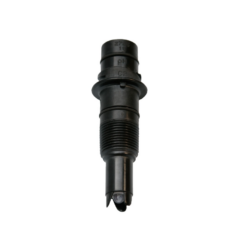Description
GF+ Signet 3-2726-00 Bulb pH electrode, PT1000 Temperature compensation
pH/ORP:
• Wetted Materials: Ryton, UHMW polyethylene, FKM, glass
• Connection: Durable DryLoc® with fold plated connections
• In-line Mounting style: Standard 3/4 inch NPT
• Submersible mounting: Available using the back of the preamplifier or sensor electronics
• Applications: Water treatment, water quality monitoring, etc.
Blind Signal In-Line Installation: Recommended Integral Mount installation with the Signet 3-2751-1 In-line Smart Sensor Electronics
Integral Calibration In-Line Installation: Recommended Integral Mount installation with the Signet 3-2751-2 In-line Smart Sensor Electronics
Electrode Care
Depending on the type of application and the accuracy needed, pH and ORP electrodes will require routine maintenance. Contaminated/dirty electrodes should be swapped with properly cleaned conditioned and calibrated electrodes. The solution used to clean an electrode varies depending on the type of coating: Caution: Always wear appropriate safety gear and exercise proper safety practices when working with or near chemicals • General Cleaning – Soak the electrode for 5 minutes in a mixture of warm tap water (< 140° F), and mild detergent such as liquid dish detergent. A soft brush, like a toothbrush may also be used to clean off particulates. • Biofilm and bacterial growth – Soak the electrode in a diluted household laundry bleach solution (pH electrodes only), 1part bleach to 10 parts water for 10 minutes. • Alkaline or Scale – Lime/calcium and mineral buildup deposits may be removed by soaking the electrode in a solution of 2% to 5%hydrochloric acid (HCl) or vinegar for no more than 5 minutes. • Acidic contaminants – May be removed by soaking the electrode in a weak caustic (less than 2% to 5% NaOH) for a few minutes only. Use the least harsh chemical which will remove the contaminant within 2-5 minutes of soaking without attacking the materials of construction. • Oily or organic coatings – Soak the probe for 5 to 10 minutes in a solution of warm tap water < 140° F, and dish detergent. Alternatively, use an appropriate solvent (isopropyl alcohol or similar) that will not attack the materials of construction. If required gently clean junction and/or glass with a very soft tooth brush, and follow up with brief soaking (2-5 minutes) in 2% to 5%NaOH(sodium hydroxide). In the case of pH (not ORP) a difficult organic fouling can be treated with household bleach (46%) as a substitute for the dish detergent. • ORP Platinum Coating – Gently wipe the electrode surface with a soft lint-free paper towel. If the various forms of chemical cleaning are not sufficient to achieve an accurate measurement and response time, a last resort would be to polish the platinum surface with a 0.3-1.0 micron alumina polishing slurry to remove any stubborn coatings. • After cleaning, rinse pH/ORP electrode in distilled or tap water, then re-examine the electrode for damage that may have been hidden from view. Sensor may not initially behave properly; and have a temporary offset due to the cleaning chemistry. Proper conditioning is always recommended.



